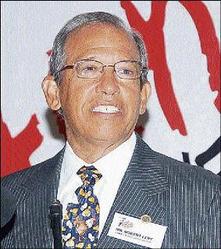John Myers Jr., Business Reporter

Robert Levy, president and CEO of Jamaica Broilers Group, said as fuel grade ethanol prices fell, JB Ethanol was fetching the same price as raw-material input. - File
Tumbling ethanol prices in the United States forced the Jamaica Broilers Group (JBG) to renegotiate prices with raw, material suppliers in Brazil in September.
Having wrapped up those talks, successfully, the company has now issued a profit warning to investors to expect profits to erode in the second quarter.
JB Ethanol Limited (JBE), the new biofuels subsidiary of the Broilers Group, has experienced a 28 per cent drop in the expected price for its manufactured ethanol, which its parent warns will likely contribute operating loss of US$3 million ($210 million) in the second period, August to October.
Operating loss
Broilers has already recorded first, quarter operating loss of J$42 million in its fuel/energy segment, off revenues of $52 million.
It expects that the losses could also extend into the third quarter.
The notice via the stock exchange comes as analysts warn ethanol prices would likely remain depressed in the United States into the first quarter of 2008.
JB Ethanol sells to the United States, the world's largest consumer of the biofuel.
Broilers' president and CEO, Robert Levy, told Wednesday Business on Monday, that logistical problems with the distribution of the biofuel from the production belts in the United States mid-west to the industrial areas on the East Coast has resulted in distributors dropping prices to off-load supplies.
The commodity, which was fetching US$2.10 per gallon, is now selling for US$1.70, Levy said.
Citigroup, in a research note also issued Monday, said ethanol prices would remain weak for the next six months, citing the expected addition of new capacity.
Citigroup forecasts U.S. ethanol capacity at 8.5 billion gallons in 2007, up from 5.4 billion last year, Reuters reported, and that capacity will reach 12.7 billion by 2008 and 13.4 billion by 2009.
Broilers' profit warning filed with the stock exchange said the expected loss was related to the group, but Levy advised Wednesday Business that this was an error, and that the figure represented losses for JB Ethanol only.
"It's not that we (the group) will lose US$3 million," he said.
The unfavourable price movements forced JBG executives to fly to Brazil in late September to meet with their suppliers of hydrated ethanol, which they import for processing into anhydrous ethanol for export to the United States, to renegotiate price.
According to Levy, JBE had a fixed-price contract with its suppliers in Brazil, but the fall in ethanol prices in the U.S. made it necessary for that arrangement to be changed and linked with price movements in the U.S.
"We have met with quite a few of the suppliers down there, and exporters, and there is a clear understanding," he said, that purchasing going forward would have to be linked to U.S. prices.
"We had purchased at a fixed price and sold (based on) U.S. prices," Levy said.
Under the fixed-price arrangement JB Ethanol purchased hydrated or wet ethanol for between US$1.70 and US$1.80 per gallon at a time when market prices for its fuel grade output was running at $2.10.
Now the price of anhydrous ethanol has fallen US$1.70 per gallon. Levy said the suppliers in Brazil have agreed to match their price with the going rate in the U.S. after the next two consignments.
The new price was not disclosed.
"Brazil has to export ethanol especially with world sugar prices where they are and they have been selling quite a bit of their ethanol at a fixed price, and of course with U.S. prices which were up at US$2.10 per gallon, people were happy to buy at a fixed price. U.S. prices have (now) dropped to US$1.70, so I think they are realising that they are going to have to price their product differently," Levy said.
Group profits
Even though ethanol prices are falling, JBG - the island's largest commercial poultry producer - says it does not expect JBE's performance to be a drain on group profits at financial year end.
"As long as you buy right, you don't have to worry about the price," Levy said. "I feel fairly certain we will recover."
JBG invested over $1 billion last year - a portion of which it obtained in loans from a special US$100 million line of credit established by the Brazilian government to facilitate investments in Jamaica's emerging ethanol market - to build its 60 million gallon ethanol dehydration plant that was completed in July.
The first shipment was delivered August 7.
The plant is, however, operating above capacity.
Levy said production was above projections and the plant is expected to produce about 70 million gallons of anhydrous ethanol at the end of the first year to July 2008.
"The plant is running at almost 110 to 115 per cent of rated capacity," he said.
john.myers@gleanerjm.com

